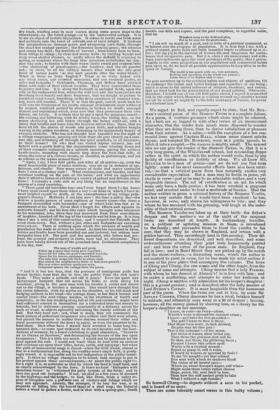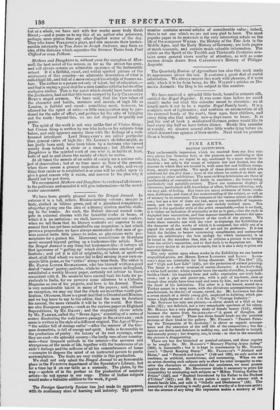We regret to find, and equally regret to state, that
Mr. But.- WER'S satirical poem of the Siamese Twins is a complete failure. As a poem, it contains passages which alone might be admired, but which are so lugged in with other verses of an inconsistent character, that the reader feels much more disposed to.wonder what they are doing there, than to derive satisfaction or pleasure from their nature. As a satire,—with the exception of a few suc- cessful lines against Captain HALL, whose name almost solicits rhyme, and tempted Dr. BOWEING, even in a public speech, to hitch it into a couplet,—the success is mighty small. The nearest idea we can give the reader of the Siamese Twins, is, that it is a very long poem, of the Whistlecraft school, but resembling Beppo rather in the spirit in which the author would write, than by any facility of versification or fertility of ideas. We all know Mr. BULWER to be a man of genius—and we do not use that term lightly: some of his most successful efforts have also been satiri- cal,—so that a satirical poem from Win naturally excites very considerable expectation. But a man may be fertile in prose, yet sterile in verse—just as he may be au admirable walker, and a very despicable dancer. The art of versification is an art for which some only have a facile genius : it has here overlaid a pregnant mind, and crushed under its load a multitude of fancies. Had the author written in prose a satirical history of the Siamese Youths, we feel very certain that it would have been excellent he-has, however, in verse, only shown his willingness to bite ; and they whom he has menaced with his grinning, will laugh at the imbe- cility of their satirical censor.
The Siamese Youths are taken up at their birth: the father's
despair and the mother's wo at the sight of the conjunct twins are described at length. A bookmaking traveller, on a political or agitating mission in Siam, is introduced to the family ; and persuades them to trust the youths to his care, that they may be shown in England, and return with. a golden harvest. They accordingly land in this country. Their dif- ferent dispositions are described, and well described, and some awkwardnesses attending their joint state humorously pointed out : and here the virtue of the poem ends. In England, they fall in love ; and in Bond Street they are picked up by the watch and the street-walkers,—a disgusting scene, Which the author is not content to paint in verse, but he has made his artist outline it in one of the poor plates that accompany the volume. The loves of Ching and Chang, the one comic and the other tragic, form the subject of some sad attempts. Ching fancies that a lady Frances, with whom he has danced at Almack's ! is in love with him ; and he scales a scaffolding, and attempts to enter her bedroom at night. Chang is smitten with admiration for his keeper's daughter : this is a grand passion ; and is described after the lofty manner of Lord BYRON'S Corsair. It is more laughable than the humorous
part of the poem. When the twins are cut in two, by some Sir ASTLEY COOPER, Chang discovers he has a rival, betalies himself to solitude, and ultimately runs away in a fit of despair ; however, all the money gained by showing him, as a dowry for the keeper's daughter on her marriage. "I know, in your—as every—clime, Wealth's want is deemed the sternest crime ;
I know—and have for this provided—
The gold I leave to thee is thine, That those twin souls, its lack divided, Its gain may let thee join ! This is the compact !—if the moon,
Ere thrice it wanes, their bridal see, Then thine the precious dust will be. To thee, not them, the glittering boon ; Because I know this yellow spell Works with a twofold miracle :
Reject or grasp it, still it rules, If woo'd by knaves or spurned by fools ! To me 'tis nought—yet that refined Dim mist with which its shadows blind The vision of all mental eyes— '
Which ye, sweet Europe's dupes, call wise—
Might make these lovers rather choose Hope, peace, life, soul itself to lose, Than bow the stiff-necked pride to take What I without a sigh fosrake."
So farewell Chang—he departs without a sous in his pocket,.
and is heard of no more.
There are some tolerably smart verses in this bulky volume ;. but as a whole, we have met with few works more truly Grub Street ;—and it pains us to say this of an author who possesses, perhaps, more genius than any other English writer of the day. They who know Ftimonvo's plays, and can measure their imitea- savable inferiority to Tom Jones or Joseph Andrews, may form an idea of the distance which separates the Siamese Twins from Paul Cliford or even Pelham.



























 Previous page
Previous page